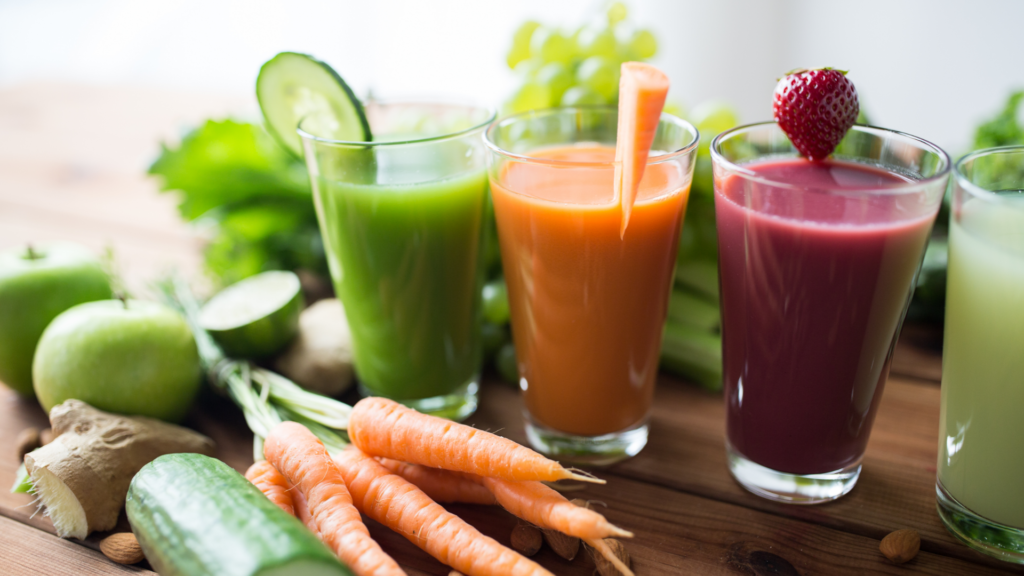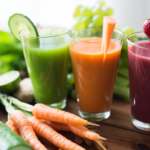
In today’s fast-paced world, maintaining good health and well-being is of utmost importance. One simple yet effective way to enhance our overall wellness is by incorporating fresh juices into our daily routine. Fresh juices are not only delicious but also packed with essential nutrients that can have a profound impact on our health. In this blog post, we will delve into the health benefits of fresh juices, explore the key nutrients they contain, and understand how they positively influence our well-being.
Table of Contents
- Introduction
- The Nutritional Value of Fresh Juices
- Key Nutrients in Fresh Juices
3.1 Antioxidants
3.2 Vitamins and Minerals
3.3 Phytonutrients - Health Benefits of Fresh Juices
4.1 Boosting Immunity
4.2 Enhancing Digestion
4.3 Detoxification and Cleansing
4.4 Hydration and Skin Health
4.5 Weight Management
4.6 Increased Energy Levels - How to Incorporate Fresh Juices Into Your Routine
- Conclusion
- Special Note To Reader
- FAQ
- Articles of Interest
The Nutritional Value of Fresh Juices
Fresh juices are a concentrated source of vital nutrients that can promote optimal health. By extracting the juice from fruits and vegetables, we can obtain a potent blend of vitamins, minerals, antioxidants, and phytonutrients that are easily absorbed by our bodies. These nutrients work synergistically to support various bodily functions and contribute to overall well-being.
Key Nutrients in Fresh Juices:
Antioxidants
Fresh juices are rich in antioxidants, which play a crucial role in protecting our cells against oxidative stress and reducing the risk of chronic diseases. Antioxidants such as vitamin C, beta-carotene, and flavonoids help neutralize harmful free radicals, boost our immune system, and promote healthy aging.
Vitamins and Minerals
Fresh juices are a fantastic source of essential vitamins and minerals that our bodies require to function optimally. Vitamin C, vitamin A, potassium, magnesium, and folate are commonly found in various fruits and vegetables, providing a wide range of health benefits, including improved immune function, strong bones, and better cardiovascular health.
Phytonutrients
Phytonutrients are natural compounds found in plant-based foods, and fresh juices are brimming with them. These bioactive substances have been associated with a reduced risk of chronic diseases such as cancer, heart disease, and inflammation. Examples of phytonutrients found in fresh juices include lycopene in tomatoes and beta-cryptoxanthin in oranges.
Health Benefits of Fresh Juices:
Boosting Immunity
The abundance of vitamins and antioxidants in fresh juices helps strengthen our immune system, making us more resistant to infections and diseases. Regular consumption of fresh juices, particularly those containing vitamin C-rich citrus fruits, can support the production of immune cells and enhance our body’s defense mechanisms.
Enhancing Digestion
Fresh juices can aid digestion and improve gastrointestinal health. Certain fruits and vegetables, such as apples, pears, and leafy greens, are known to contain dietary fiber, which promotes regular bowel movements and helps prevent constipation. Additionally, enzymes present in fresh juices can assist in breaking down food and maximizing nutrient absorption.
Detoxification and Cleansing
Fresh juices are often associated with detoxification and cleansing due to their natural ability to eliminate toxins from the body. Ingredients like lemon, ginger, and leafy greens have detoxifying properties that support liver function and assist in the removal of harmful substances. Including these juices in
our daily routine can aid in flushing out toxins, purifying the bloodstream, and rejuvenating the body.
Hydration and Skin Health
Staying hydrated is vital for overall well-being, and fresh juices can contribute to our daily fluid intake. Fruits like watermelon and cucumber have high water content, helping to keep us hydrated and supporting healthy skin. The vitamins and antioxidants in fresh juices also promote collagen production, leading to a more radiant and youthful complexion.
Weight Management
Incorporating fresh juices into a balanced diet can be beneficial for weight management. These juices are low in calories and high in nutrients, making them a satisfying and nutritious choice. Additionally, the fiber content in certain juices can promote feelings of fullness and curb unhealthy cravings, aiding in weight loss or maintenance efforts
Increased Energy Levels
The natural sugars present in fresh juices provide a quick source of energy without the crash associated with processed sugars. The combination of vitamins, minerals, and antioxidants in these juices supports optimal cellular function, helping to combat fatigue and increase energy levels throughout the day
How to Incorporate Fresh Juices Into Your Routine:
Now that we understand the numerous health benefits of fresh juices, let’s explore how we can easily incorporate them into our daily routine. Here are a few simple tips:
Start with a variety of fruits and vegetables:
Experiment with different combinations to enjoy a wide range of flavors and maximize nutrient intake.
Invest in a quality juicer:
Having a reliable juicer at home makes it convenient to extract fresh juice whenever you desire.
Make it a habit:
Set a specific time each day to enjoy your fresh juice, such as in the morning as part of your breakfast or as an afternoon pick-me-up.
Use seasonal and organic produce:
Whenever possible, choose organic fruits and vegetables to minimize exposure to pesticides and maximize the nutritional value of your juice.
Don’t forget the pulp:
Some juicers separate the pulp from the juice, but the pulp contains valuable fiber. Consider incorporating it back into your juice or using it in other recipes like smoothies or soups.

Conclusion
Fresh juices offer a plethora of health benefits, thanks to their abundance of nutrients, antioxidants, and phytonutrients. Regular consumption of fresh juices can boost immunity, improve digestion, aid in detoxification, promote hydration and skin health, support weight management, and increase energy levels. By incorporating these vibrant and nutrient-rich beverages into our daily routine, we can enhance our overall well-being and enjoy the countless advantages they offer. So why not raise a glass to your health and start juicing today?
Remember, while fresh juices are beneficial, it’s essential to maintain a balanced diet and consult with a healthcare professional if you have specific dietary concerns or medical conditions. Cheers to vibrant health and a refreshing journey towards wellness!
Special Note To Reader
If you would like to view a Juice which is effective in reducing Stubborn Fat, click here!
FAQs
Are fresh juices as healthy as eating whole fruits and vegetables?
While fresh juices offer concentrated nutrients, they may lack the fiber found in whole fruits and vegetables. However, they can still provide valuable vitamins, minerals, and antioxidants that contribute to good health.
Can I replace a meal with fresh juice for weight loss?
Fresh juices can be a healthy addition to a balanced diet but should not be used as a complete meal replacement. They can support weight management when combined with a nutritious eating plan and regular exercise.
Can I store fresh juice for later consumption?
Fresh juices are best consumed immediately to preserve their nutritional value. If necessary, store them in an airtight container in the refrigerator for a maximum of 24-48 hours to minimize nutrient loss.
Are there any precautions to consider when consuming fresh juices?
While fresh juices are generally safe, it’s important to be mindful of any allergies or sensitivities to specific fruits or vegetables. If you have underlying health conditions or are on medication, consult with your healthcare provider before making significant changes to your diet.
Can I mix different fruits and vegetables in a single juice?
Absolutely! Mixing various fruits and vegetables allows you to enjoy a diverse range of nutrients and flavors in your juice. Be creative and experiment with combinations that suit your taste preferences.
Can fresh juices help with digestion problems such as constipation?
Yes, certain fruits and vegetables in fresh juices contain dietary fiber, which can aid in improving digestion and relieving constipation. Additionally, the enzymes present in fresh juices can assist in the breakdown of food.
Are there specific fresh juices that are beneficial for skin health?
Yes, fresh juices containing watermelon, cucumber, and citrus fruits are particularly beneficial for hydrating the skin and promoting a healthy complexion. The antioxidants in these juices also contribute to skin health and rejuvenation.
Can fresh juices help boost the immune system?
Absolutely! Fresh juices, especially those rich in vitamin C, such as citrus fruits, can boost immune function. The antioxidants in fresh juices also support overall immune health by protecting cells against oxidative stress.
Can I consume fresh juices if I have diabetes?
If you have diabetes, it’s crucial to monitor your sugar intake. Choose fresh juices with a lower glycemic index, such as green vegetable juices, and consult with a healthcare professional for personalized guidance.
Can children consume fresh juices?
Fresh juices can be a healthy addition to a child’s diet, but moderation is key. Ensure the juices are diluted with water and offer a variety of fruits and vegetables to provide a balanced nutrient intake for growing bodies.
Remember, while these answers provide general guidance, individual needs and health conditions may vary. It’s always advisable to consult with a healthcare professional or a registered dietitian for personalized advice.

Articles of Interest
The Surprising Science of Intermittent Fasting: A Proven Weight Loss Strategy
Bananas: A Must-Have Superfood for Optimal Health
The Gut-Brain Connection: Understanding the Importance of Gut Health











